In Canada, more than 747,000 people are living with Alzheimer’s or another type of dementia. Worldwide, there are at least 44 million people with dementia. There’s no cure for dementia yet, but there are support programs that can help patients and their families.
If you have a loved one who was recently diagnosed with Alzheimer’s or dementia, you may not know what support programs are available or what exactly those programs entail. Here’s a complete guide to what you can expect from Alzheimer’s and dementia support programs.
Participation in Activities
Support programs for dementia patients typically include participation in activities, which can help improve the moods and mental wellbeing of patients. Activities can help promote their self-esteem and help them maintain their residual skills. Even if people won’t remember the activities afterwards, they’ll can still get enjoyment from them in the moment.
Dementia support programs customize activities for each person. Appropriate activities will vary depending on each person’s former lifestyle and hobbies. The Senior Gems dementia support program recommends activities based on the stage of dementia.
For example, people in the earliest stages may want to have a meal at a familiar restaurant. Later, people may want to perform favourite tasks from the past for a short time. In the later stages of dementia, activities may include going for a short walk or listening to music.
Behavioural Interventions
Alzheimer’s disease can affect the way people behave. In the early stages of Alzheimer’s, people may become depressed, irritable, or anxious. As the disease progresses, people may become angry, agitated, or even aggressive.
These behaviours can be one of the hardest part of caring for someone with Alzheimer’s disease. Dementia support programs focus on behavioural interventions to help cope with these changes. These interventions may include redirecting the person’s attention, alleviating confusion, or monitoring comfort factors.
Disease Education
Educational programs are another important component of dementia support programs. Alzheimer’s and dementia are serious, and family members and patients need to know as much as possible about them. Education programs may focus on the patient. These programs help with things like coping with memory loss and living your best life for as long as possible.
Education programs are also geared towards families and caregivers. Caring for a person with Alzheimer’s or dementia can be a big challenge. Caregivers need to know how to care for their family members. They need to know how to respond to dementia-related behaviours, and how to communicate with their loved one. Caregivers may need also need education about coping with the diagnosis, understanding the resources available to them, or keeping their loved one safe.
Building a Care Team
People with Alzheimer’s or dementia need help from a care team. By building a care team, people with dementia have access to a network of helpers. Every helper will have their own role, which prevents the need to scramble for help in an emergency. A structured care team provides support to dementia patients. It also reassures you that your loved one will be looked after.
The care team can include medical professionals like family doctors, neurologists, counsellors, or other professionals. The team can also include volunteers from the community, neighbours, or family members.
As Alzheimer’s or dementia progress, people may need more help than their neighbours and family members can provide. There’s only so much support you can provide without experiencing some form of “caregiver burnout”. At this point, professional caregivers may need to be added to the care team. Professional caregivers can provide supervision or support with daily tasks, along with companion care and ensuring safety in the home.


